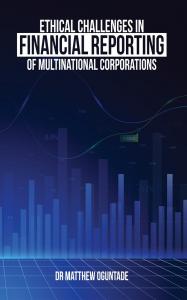Financial Statement Audits Play Pivotal Role in Combating Corporate Fraud, Study Finds
Dr. Oguntade, Senior Online Lecturer at Aunty Yemi College, combines academic expertise with finance leadership at Zeeman International and Simba Group; he is a member of CIMA and CIBN.”
CHICKAMAUGA, IL, UNITED STATES, June 3, 2025 /EINPresswire.com/ -- In an era where public trust is critical to organizational success, financial statement auditing is emerging as a key defense against fraud and corporate misconduct. Far beyond its regulatory function, auditing reinforces transparency, accountability, and ethical leadership in today’s business environment.— Dr Matthew Oguntade
New research highlights how routine audits serve not only as compliance tools but as integral components of a company’s fraud risk management strategy.
Auditing as a Foundation for Trust
Financial statement auditing involves an independent examination of a company’s financial records to ensure accuracy and fairness. Auditors assess the reliability of reported figures, the strength of internal controls, and adherence to accounting standards and legal requirements.
More than a formality, audits provide critical assurance to shareholders, regulators, and the public that a company’s reported financial outcomes are rooted in fact—not fiction.
A Preventative Measure Against Fraud
While audits cannot detect every instance of fraud, they create an environment where deception is more difficult to conceal. The consistent presence of audit oversight promotes ethical behavior, enforces accountability, and builds a culture of integrity within organizations.
Companies with well-established auditing practices have been shown to experience fewer fraud incidents, fewer reputational risks, and stronger stakeholder confidence. This is particularly vital in a landscape where fraud can result in financial loss, legal consequences, and long-term damage to brand reputation.
Integrating Auditing Into Fraud Risk Management
Experts emphasize that audits are most effective when integrated into a broader fraud prevention framework. This includes:
• Establishing a documented fraud policy
• Conducting regular evaluations of internal controls
• Providing continuous employee training and ethics education
• Setting up formal mechanisms for reporting suspicious activity
• Implementing a swift, coordinated response plan for investigations
Such a structure reinforces zero-tolerance for unethical conduct and signals a proactive stance on corporate governance.
Beyond Compliance: The Role of Assurance Engagements
Auditing often leads to assurance services—evaluations that offer deeper insights into both financial and non-financial operations. These engagements go beyond checking numbers, helping organizations assess systems, controls, and performance against stated objectives.
By highlighting inefficiencies, identifying risks, and recommending improvements, assurance services support better decisions across departments and elevate the company’s overall resilience.
Auditing as Ethical Oversight
Financial statement audits are more than financial exercises; they are mechanisms of ethical oversight. They protect investors, support responsible management, and uphold the integrity of the business ecosystem.
In a high-stakes global economy, where a single scandal can undermine years of growth, audits provide the clarity and trust necessary to navigate complexity and maintain stakeholder confidence.
Dr Matthew Oguntade
Boundless Book Publishers
+1 859-270-5850
mao.oguntade@yahoo.com
Legal Disclaimer:
EIN Presswire provides this news content "as is" without warranty of any kind. We do not accept any responsibility or liability for the accuracy, content, images, videos, licenses, completeness, legality, or reliability of the information contained in this article. If you have any complaints or copyright issues related to this article, kindly contact the author above.

